
Zimbabwe
Mukuvisi Woodlands, Lake Chivero Recreational Park, and Wild Is Life Trust and ZEN examples of local efforts. Support them by visiting.
Waste management poses challenges. Litter appears in some areas outside affluent suburbs. Recycling infrastructure is limited, mostly informal.
Water scarcity recurs in Harare, leading to rationing, especially during the dry season. Be mindful of water consumption.
Make choices that reduce environmental impact.
Your efforts contribute to local water conservation.
Minimize your waste by using reusable items. Dispose of waste properly.
When booking, look for accommodations that demonstrate environmental awareness. This includes practices like water and energy saving, waste reduction, and sourcing local produce.
Providers like Terrapass or Cool Effect mitigate air travel impact.
Learn more about carbon offsetting.Explore sustainable outdoor gear from Patagonia and reusable products at Package Free Shop.
Discover sustainable products.Your choices contribute to preserving Harare's natural beauty. Prioritize eco-friendly practices throughout your stay. Explore sustainable outdoor gear from Patagonia and reusable products at Package Free Shop.
Interacting respectfully with locals and their customs is a cornerstone of responsible travel.
Institutions like the National Gallery of Zimbabwe and the National Museum contribute to cultural preservation.
Learning a few basic Shona phrases shows consideration. Locals appreciate the effort.
When visiting religious sites, dress modestly (shoulders and knees covered). Remove your shoes if required, and maintain a quiet, respectful demeanor.
Always ask permission before photographing people. Avoid intrusive photography of vulnerable individuals. Be sensitive and discreet.
Dress modestly, cover shoulders and knees. Remove shoes if required. Maintain quiet, respectful behavior.
Value individuals' privacy. Avoid capturing images that might cause discomfort or disrespect.
Your conduct shapes local perceptions. Practice courtesy and cultural awareness. For tours focused on ethical practices, consider G Adventures.
Support local communities and ensure your travel contributes positively to the economy.
Support local communities by participating in initiatives like the Dzikwa Trust (if visits are arranged respectfully).
Make a conscious effort to support local businesses. Eat at local restaurants, buy goods from local markets, and use local tour guides and transport services.
Research and donate to reputable, registered local NGOs or community development projects. Focus on education, health, or conservation organizations.
Exercise discretion. Support legitimate charities rather than giving directly to beggars, to avoid perpetuating dependency cycles.
Avoid visiting or volunteering at orphanages unless ethical practices are thoroughly verified. 'Orphanage tourism' can cause harm.
Consider organizations like Zimbabwe National Society for the Prevention of Cruelty to Animals (ZNSPCA).
Be aware of practices that might exploit communities. Verify the legitimacy of any charity or institution before donating or volunteering. Protecting children and vulnerable populations comes first.
For conservation efforts, visit The Rainforest Site (GreaterGood).